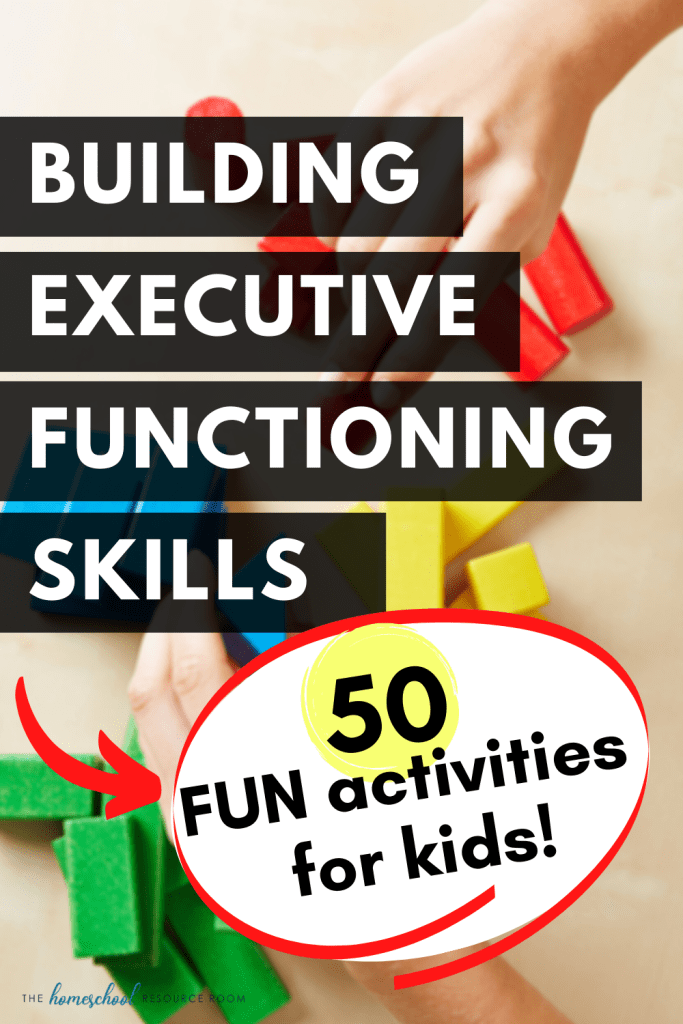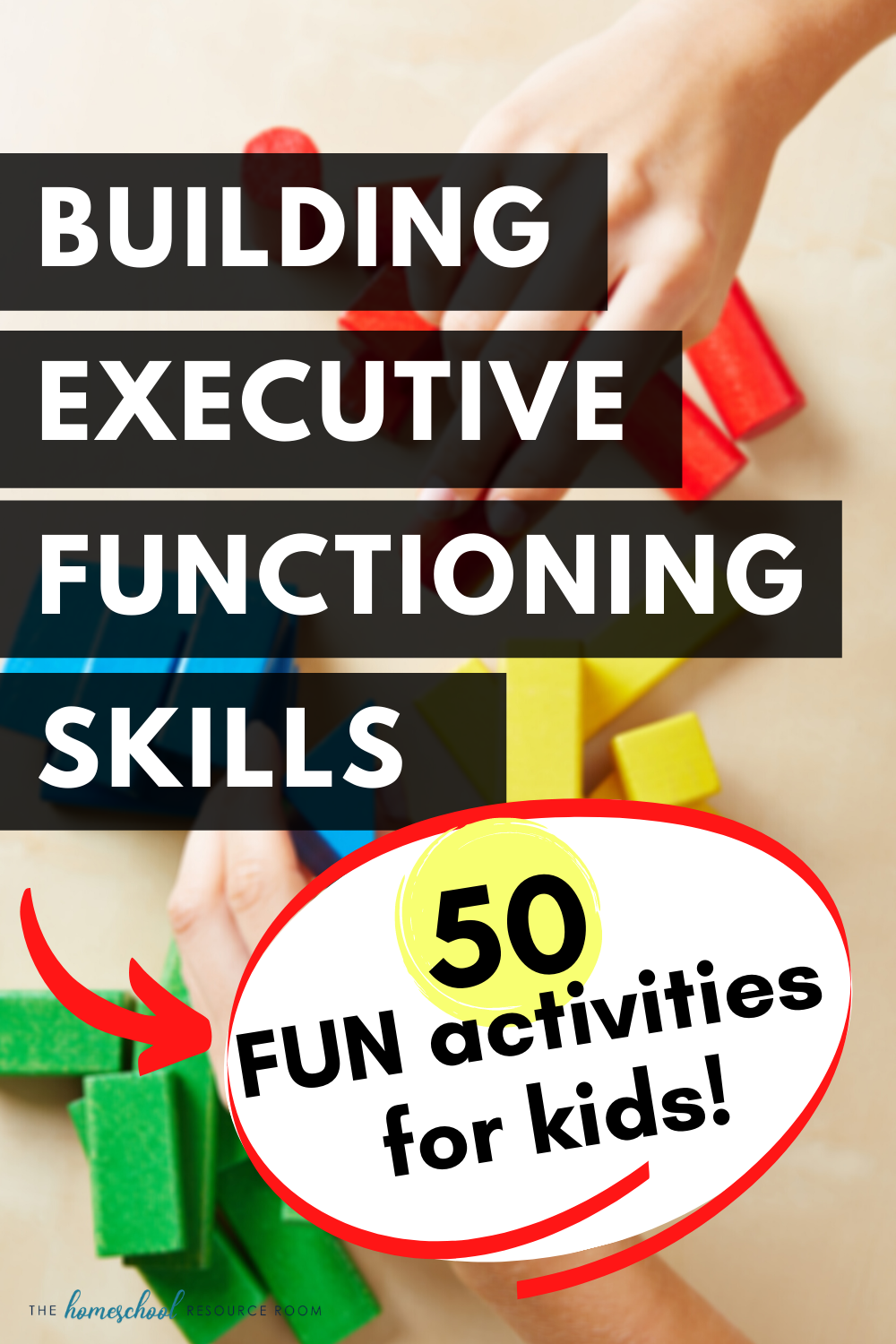This post may contain affiliate links. See our disclosure policy for details.
You might not have heard of executive functioning activities before, but you just might be glad to learn about them. After all, there are few things as frustrating in the life of a parent as watching your child struggle. And there are children in virtually every household in America struggling with executive dysfunction.

For those who don’t know, executive dysfunction is a neurological symptom common for millions of people with a range of disorders, conditions, and diseases. Those diagnosed with anything from autism, ADHD, traumatic brain injuries, depression, learning disabilities, and even Alzheimer’s can have impaired executive functioning abilities. If you aren’t sure if your child struggles with executive functioning, compare them with our executive functioning checklist.
To make matters more complicated, executive dysfunction can be further broken down into a number of categories. Experts don’t always agree on how many! For the purposes of this article, I’ll discuss six of the most frequently discussed areas of challenge: Organization, Time Management, Planning & Problem Solving, Attention, Working Memory, and Inhibition. All of these are places that parents of children with executive dysfunction wish they could help their child improve.
Luckily, problems with executive function aren’t a death sentence, or destined to stay problems forever. With coaching, practice, and positive reinforcement, children who struggle with executive dysfunction can improve – sometimes by leaps and bounds. Executive functioning activities are the way you do that. Some activities are daily habits or practices. Others are conversation starters, and some are fun games your child won’t even realize are designed to help them improve!
How to use the Masterlist
I’ve created this reference to be broadly applicable to children anywhere from k-12 struggling with their executive functioning. (You’ll see I pay much more attention to executive functioning activities for younger children, however.) I didn’t break the list up into age categories though, since children develop at varied rates. You as the parent will be able to sense whether your child might benefit more from playing hopscotch or chess.
To get started, let’s chat about the few general principles you should follow when trying to improve any aspect of your child’s executive function:
Practice often
The more frequently someone is exposed to new skills or material, the faster they’ll start to integrate those into their repertoire. However, if you wait too long between rounds, and children might have lost progress they made, or have forgotten how to do it. Which may require a complete re-teach. A few times a week is the sweet spot for most children for these masterlist activities, but mileage may vary.
Steadily increase the level of challenge
When trying to build up someone’s working memory, for example, having them play 20 questions every day for a month is more likely to frustrate, annoy, or outright enrage them instead of helping. When you notice your child starting to master one activity, switch it up and offer something slightly more advanced. This is especially true for children with ADHD, since their brains can get bored very quickly without novel stimulation.
Weave in physical activity if possible
Types of physical activity that include character-building or mindfulness focuses, for example traditional martial arts or yoga, have the most evidence-based success in improving executive functioning. However, there’s plenty of other studies backing up the benefits of exercise and movement in general for executive dysfunction. Something is better than nothing!
As a final point, I’d also encourage you to brush up on any executive functioning skills you find yourself lacking in. It is usually much easier for our children to look to us for examples of how to live. Their functioning is even more likely to improve if your skills are in decent shape. You can even play these games or do joint activities with your child. Explain that you want both of you to improve your skills. Humility and honesty can go a long way with most children, and it just might improve their willingness to play along if they know you struggle like they do.
So without further ado, here is the Executive Functioning Activity Masterlist!
Organization Executive Functioning Activities

- Chores that involve sorting and categorizing like putting away dishes, matching and folding laundry, storing groceries, etc
- Card games that require you to organize the playing cards in your hand (rummy, uno, crazy 8s, etc)
- Develop a hobby collection. Rocks, stamps, coins, Pokemon cards, etc. Lends itself to sorting and resorting based on different categories
- Visual anchor charts
- Writing daily (or weekly) plans
- Checklists, either handwritten or digital, where items are daily crossed off once completed
- Graphic organizers to help with sequencing thoughts, connecting ideas, and noting relationships between concepts.
Time Management Executive Functioning Activities
- Writing weekly, monthly, even yearly plans can help children visualize abstract concepts like time
- Use things that ding! This includes timers, phone apps, watch alarms, clocks, etc
- Tell stories- either printed or made up by you- over and over that emphasize a sequence. For example: first wake up, then brush teeth, then eat breakfast, etc
- Posted schedules, especially those with eye-catching visuals or colors
- Daily whiteboards: have children write the month, day, day of the week, and year. Include upcoming events and those from the recent past. Older children can add daily activities.
- Time estimation games: how long will it take to drive to Grandma’s? How much time passes between tagging the front door then sprinting to the stop sign?
- Learning a musical instrument
Planning & Problem Solving Executive Functioning Activities

- Martial Arts (especially traditional variations with character-building elements)
- Rubik’s Cubes
- Brain teaser puzzles & logic problems
- Strategy-based board games (checkers, Battleship, chess, Settlers of Catan, or Ticket to Ride)
- Writing weekly, monthly or even yearly plans. Can help children foresee conflicts of interest or changes in routines, prompts them to plan ahead and problem solve.
- Geocaching and/or orienteering
- Scavenger hunts derived from a series of clues
Attention Executive Functioning Activities
- Yoga
- Martial Arts
- Dance
- Concentration card game
- Red light, green light
- Jump rope games & complicated variants (double dutch, chinese jump rope)
- Hide & Seek, plus dim lighting versions like Flashlight Tag or Manhunt
- Laser Tag, paintball, & hunting for older children
- Learning a musical instrument
- Reading books like I Spy
- Rubik’s Cubes
- Games that require you to follow one or many objects like “Who’s got the button” or “Lucky Ducky“
Working Memory Executive Functioning Activities
- Matching card games like Go Fish
- Singing rounds, or in vocal parts
- 20 Questions, I Spy, or other guessing games
- Any strategy-based board game like checkers, Battleship, chess, Settlers of Catan, or Ticket to Ride)
- Cogmed is a computer-based strategy clinically shown to improve working memory
- Hand-clapping games like Miss Mary Mack, A sailor went to sea, Double double, etc
Inhibition Executive Functioning Activities

- Simon Says
- Freeze Dance/Freeze Tag
- Mother May I
- Musical Chairs
- Martial Arts (esp with traditional focus)
- Slapjack, Spoons, and other card games that require quick responses
- Games that require turn-taking, like Candy Land, Jenga, and bowling
- Singing songs that increasingly remove words like “My hat, it has three corners”
For further reading on this topic:
- Help My Child Focus Naturally: 5 Tried and True Strategies for Home
- 25+ Learning Accommodations for ADHD
- Sanity-Saving Activities for Children with Anxiety
- Homeschooling & ADHD: Set Yourself Up for Success

Hillary is a former teacher who went rogue and became a freelance writer. When not offering support and advice to homeschooling families, she tends to her own garden, family, and cat. You can connect with her on her website, homegrownhillary.com.

